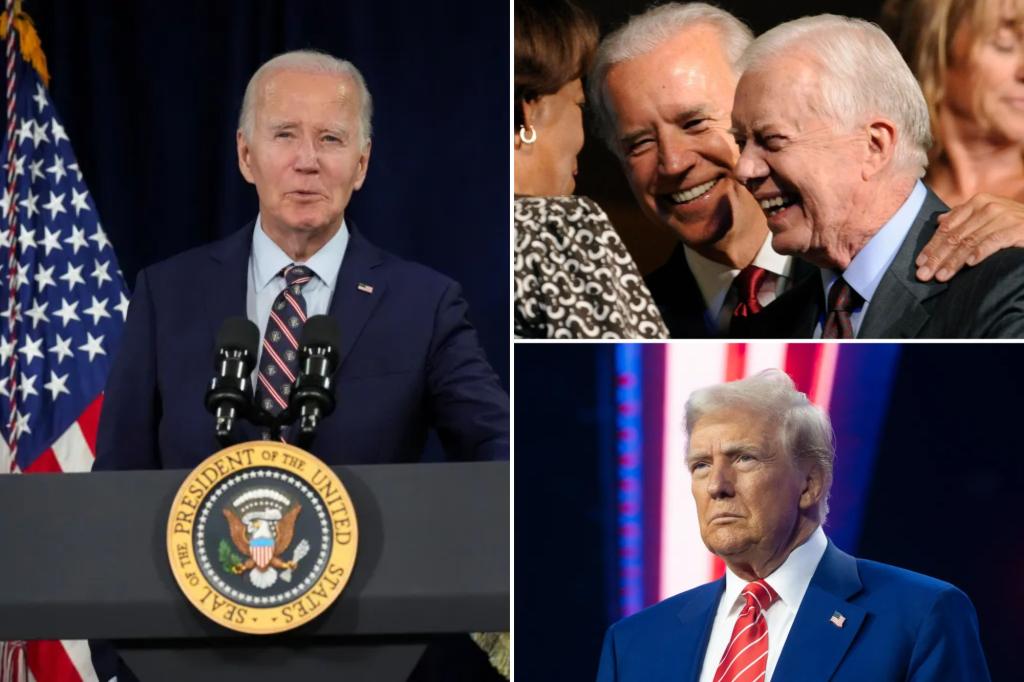A Nation Mourns a Leader of Integrity: President Biden’s Tribute to Jimmy Carter
The passing of former President Jimmy Carter at the age of 100 has elicited an outpouring of grief and reflection across the nation. President Joe Biden, his voice heavy with emotion, addressed the nation on Sunday, remembering Carter not just as a political figure but as a "dear friend" whose life exemplified principles of integrity, humility, and unwavering dedication to service. Biden’s eulogy painted a picture of Carter as a man whose character transcended political divides, a leader who prioritized decency and compassion above all else. The current president’s heartfelt tribute served as a poignant reminder of Carter’s enduring legacy and the values he embodied, values that Biden believes remain relevant and essential in contemporary society.
Biden’s personal connection with Carter, forged over five decades, added a layer of intimacy to his remarks. He recalled a pivotal moment in the 1970s when the then-Georgia Governor Carter sought Biden’s support for his presidential campaign. Despite Biden’s initial hesitation due to his relative political inexperience, Carter recognized the young senator’s potential and insisted on his involvement. This anecdote underscored Carter’s keen eye for talent and his ability to inspire those around him. Biden’s endorsement, he emphasized, stemmed not only from alignment with Carter’s policies but also from a deep admiration for his character and the inherent decency he projected.
The contrast between Carter’s approach to leadership and the current political climate was palpable in Biden’s address. Without explicitly naming President-elect Trump, Biden alluded to the stark differences in their styles and values. When questioned about the lessons Trump could glean from Carter’s legacy, Biden’s simple yet powerful response was "decency." He posed rhetorical questions, challenging the audience to imagine Carter ignoring those in need or resorting to personal attacks based on appearance or speech. This subtle yet pointed critique highlighted the erosion of decorum and civility in recent political discourse, implicitly advocating for a return to the values exemplified by Carter.
Beyond the political arena, Biden emphasized Carter’s enduring impact on American society. He lauded Carter’s post-presidency work, particularly his tireless efforts to eradicate diseases, build homes for the less fortunate, and promote peace and democracy globally through the Carter Center. These endeavors, Biden argued, demonstrated Carter’s unwavering commitment to serving others and making a tangible difference in the world. He presented Carter not simply as a former president but as a role model for all citizens, a testament to the power of individual action and the enduring importance of living a life of purpose.
While Biden’s tribute focused primarily on celebrating Carter’s life and legacy, the underlying message of restoring decency and compassion to public life resonated strongly. He challenged the notion that Carter’s values represented a "bygone era," asserting that they remain as relevant and necessary as ever. Biden’s emotional delivery and personal anecdotes painted a vivid portrait of a man who deeply admired and respected Carter, both as a leader and as a friend. His words served not only as a eulogy but also as a call to action, urging Americans to emulate Carter’s example and strive to embody the principles he championed.
In stark contrast to Biden’s deeply personal and values-driven tribute, President-elect Trump’s statement on Carter’s passing, while acknowledging his contributions, lacked the same emotional depth and focused more on the shared experience of holding the presidency. Trump’s statement, posted on Truth Social, recognized Carter’s efforts to improve the lives of Americans and expressed gratitude for his service. However, it noticeably avoided any mention of Carter’s character or the specific values he embodied. The disparity in tone and substance between the two statements further underscored the contrasting approaches of these two leaders and the divergent values they represent.










